'Doing the housework of academia': Women and minorities hardest hit by third-level working conditions
We look at the impact of insecure work on women, people with disabilities and vulnerable groups in the sector.

“WOMEN WHO GO into academia get trapped in exploitative forms of precarious work in the sector and for longer periods.”
That is according to Dr Theresa O’Keefe, sociology lecturer in UCC whose research has found that many were stuck in these jobs for 10 or more years “with few exit points into secure work”.
Her research papers, written with Dr Aline Courtois, focus on people stuck in a ‘hamster wheel’ of insecure work in Ireland.
There is a gender divide when it comes to secure work in the sector with almost 60% of permanent full-time academic roles held by men. More women work in part-time temporary academic jobs with this gap increasing in recent years to 71% in universities and 63% in ITs in 2019.
O’Keefe said this gap is hugely concerning. “The rhetoric that higher education institutions (HEIs) often use is that this flexibility suits women, because they have caring roles, so it’s not considered a problem.” She added that their studies found that women were trapped in these roles “not by their own choice”.
Her research also highlights the fact that women are “typically given the bulk of the teaching and administrative work, which impedes their progress”. O’Keefe said “this is seen as the housework of the academy”. They are also less likely to co-publish research with their supervisors.
Additional pressures such as childcare have already been shown to have a potential impact on women working in research during the first Covid-19 lockdown. An analysis conducted over the summer showed that female academics were publishing at a lower rate than their male peers during the months of March and April 2020 compared to the same months in 2019 or January and February this year.
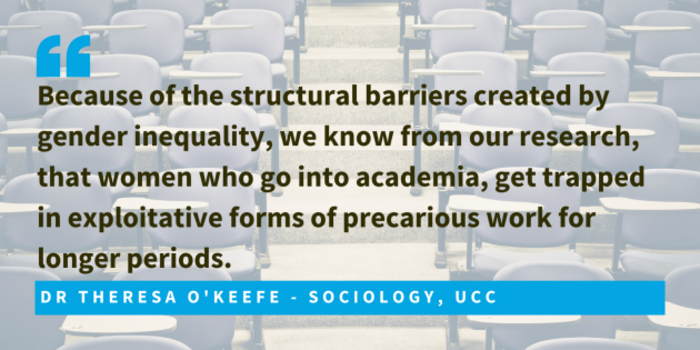
Noteworthy has spent the last six months gathering the experiences of academics and researchers working in third-level institutions.
Earlier today, we revealed that short-term contracts and instability of employment are rife across the sector. This evening, we explore how precarious work is having an impact on diversity in HEIs.
Low numbers with disabilities
In addition to women being affected by barriers created by gender inequality, other diverse groups – such as people with disabilities or from minority or ethnic backgrounds – face obstacles when trying to find jobs or funding in the higher level sector.
“There isn’t a culture or history of disabled people being involved in academia,” explained Vivian Rath, who is on the Irish Human Rights and Equality Commission (IHREC) Disability Advisor Committee.
He suggested that the reason the impact of precarious and temporary work on people with disabilities isn’t being raised at a national level is because figures for people with disabilities working in HEIs are so low.
“My community is not progressing from undergraduates to postgraduates,” said Rath. He has just finished his PhD and said there are many additional barriers for people with disabilities who want to complete this training.
In AHEAD’s latest report for the 2018/19 academic year across HEIs, it states that 7.1% of undergraduates had a disability but this dropped to just 2.4% of postgraduates.
A major hurdle for people with disability is accessing funding, according to the advocate, who said this may not be flexible for those who may need extra time to complete their PhD or cannot undertake some expected activities. In Rath’s case, he found funding was an issue as he did his PhD over eight years.
PhDs are expected to lecture, give tutorials, write papers as well as organise and go to conferences, he explained. “That’s a huge workload and can be extremely challenging.”
To improve this, people in HEIs should be made comfortable in disclosing their disability and made aware of supports they can avail of, according to Rath. These supports include assistive technology, notetakers, academic support, sign language interpreters and transport.
He added that some disabled people are “unsure about disclosing their disability as they’re afraid it might affect their potential for promotion or accessing jobs”.
In part three of this investigation, we spoke to a number of postgraduate groups about their campaign to be recognised as workers.
 Disability advocate, Vivian Rath, says more support is needed for postgraduates and staff with disabilities in HEIs.
Disability advocate, Vivian Rath, says more support is needed for postgraduates and staff with disabilities in HEIs.
The Comprehensive Employment Strategy for People with Disabilities requires public bodies to achieve a target of 3% of staff with disabilities and this is rising to 6% by January 2024.
The latest Equality Report from TCD in 2017/18 states that “2.9% of Trinity staff have declared a disability”, adding “the true figure may be higher”. For 2019, NUI Galway reported there were 3.6% of staff with disabilities. In 2018, Maynooth University undertook a survey of staff and found that 7% stated they had a disability or health condition, with further responses saying they were unsure or would prefer not to say.
Rath said it is great that so much is being done in terms of gender equality in HEIs, especially with 14 HEIs and 42 departments now holding Athena SWAN awards, which require HEIs to address issues on gender. However, Rath felt it would be better if other forms of diversity such as disability were also included as part of this work.
Absence of data
“The Athena SWAN charter is a framework that is used across the globe to support and transform gender equality in higher education and research,” according to the HEA. This charter was launched in Ireland five years ago and is the main framework used for action on diversity in the sector.
Since 2016, the HEA has collected gender data from HEIs and published annual reports on the gender profile of staff. However, “the absence of systematic data” on other aspects of diversity in Ireland was highlighted in a report by the Royal Irish Academy (RIA) and the British Council in September.
Following this, the HEA made it compulsory for HEIs to provide an annual breakdown of ethnic diversity, starting from December this year.
“Up to now, this data has not been collected by HEIs for various reasons which can differ from institution to institution, often relating to privacy issues and the sensitivity of the data in question. For this reason, a national statement on the use of ethnicity categories in Irish Higher Education has been published and endorsed by HEIs.”
Impact on migrants
We attempted to gather some information on this aspect of diversity in HEIs by asking for the number of academic staff on visas for each of the past three academic years through freedom of information (FOI) requests. Some HEIs gave us figures for their entire staff as they had “no records held centrally” for academic staff alone.
The number of academic staff on visas or work permits was in the single digits for most ITs and between 5% and 8% in universities that provided this data to Noteworthy.
-
You can support the huge volume of additional work required over the past number of months because of time-consuming FOI requests by supporting the Noteworthy general fund or giving the gift of investigative journalism to a loved one this Christmas.
Of the ITs, Waterford IT had the highest amount with 23 staff on visas as of the 2019/20 academic year.
Numbers were slightly higher across the board in the universities.
UCD stated that 8% of academic staff were from outside the EU and UK last year which had increased from 6% over the previous two academic years. UCC had figures of 8% of all of their workers (248 staff on average) and NUI Galway had figures of around 5% (36 staff on average) over the past three years.
A spokesperson from DCU said that “there are no records available on staff requiring visas”. They added that they had a total of 124 staff who required hosting agreements. Maynooth University stated that “64 non-EU nationals requiring work permits have been recruited since 2017”. Trinity College had 180 academics with non-EEA nationality as of May 2020.
Difficulty in obtaining permanent work in higher level, as detailed in part one of our investigation, can be a problem for those applying for certain work permits in Ireland as job security is needed in order to obtain one.
Dr Sinead Pembroke, a researcher in Trinity College, said that the growth in casualisation in third level had an impact on migrants she spoke to as part of a report she wrote, ‘Precarious work precarious lives’, for the Irish think-tank TASC last year. She said some people interviewed faced leaving Ireland as they could not get a permanent job.
 Ilaina Khairulzaman says lack of diversity will have a huge impact on universities.
Ilaina Khairulzaman says lack of diversity will have a huge impact on universities.
Ilaina Khairulzaman, who completed a science degree and masters in Ireland, wrote about this issue and how it impacted her for Noteworthy last year.
“Being from Malaysia, temporary and short-term contracts weren’t an option for me as I needed job security in order to apply for a work permit.” She found a job in Ireland before her two-year graduate visa expired but it was outside of the higher level sector.
“This entire process was very stressful and a constant worry for two years. I only realised the effect it was having on me once I settled into my new job and a huge weight was lifted off my shoulders.”
Taking leave is ‘challenging’
Dr Susan Kathleen Fetics, co-director of Women in Research Ireland, also left academia but for a different reason – to save her “lifestyle and mental health”. She said that “you need to be working seven days a week as weekends are spent catching up on articles and writing grant proposals”.
You are expected to publish, have funding, do community outreach, go to conferences, promote your work, network, mentor and be mentored, she explained. “The pressure that’s put on you from the culture of criticism and what needs to be accomplished – it’s never enough.”
If you are trying to have a family on top of this with a short fixed-term contract, it makes it even more challenging. This is especially true, according to Fetics, if you need to take time off for maternity leave or childcare during a one- or two- year project. This can lead to your research “being scooped” by another group or missing out on funding opportunities.
During the course of this investigation, we spoke to a number of women who highlighted this as a major issue for them and spoke about the struggles they had either when starting a family or caring for children while working in HEIs.
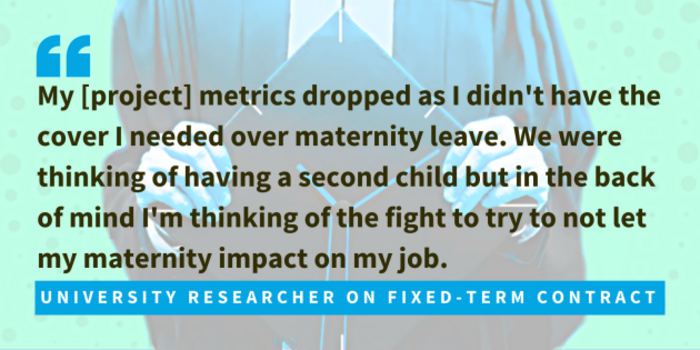
One university researcher on a fixed-term contract said that because adequate cover was not provided over her maternity leave, she struggled to meet the targets required by the funding body on her return. Being on a fixed-term contract, she felt this affected her future prospects of employment.
“It’s very hard to get hold of data about mothers in academia,” according to UCD lecturer Dr Enrica Maria Ferrara who wrote an article in June on the “enduring baby penalty”.
Though there’s no official Irish data on this, Ferrara said “there’s no reason to believe that Ireland isn’t in line with the global trend that mothers are impacted very heavily”.
The system of evaluation of academics needs to change to improve this, she said. It should be judged “not by quantity, but by quality”.
Ferrara suggested that, for women with children, a defined length of time, such as two years, should be taken into account in job and funding applications for time lost while having children. That should include not only maternity leave, she explained, but also breastfeeding and childcare.
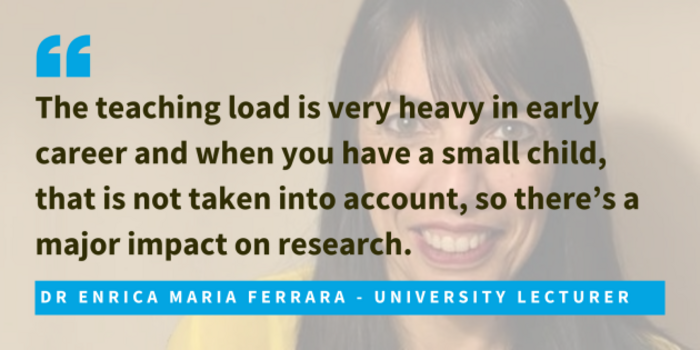
This is currently the case for some funding bodies but not all. For example, you are eligible to apply for specific European Research Council (ERC) grants at certain times in your career. For the ‘Starting Grant’, researchers who finished their PhD from two to seven years ago can apply.
If the applicant had a baby during this crucial five-year window, then they can add 18 months on for every child born. For example, this would allow those who had two children post-PhD to apply for this grant up to ten years after their PhD, instead of seven.
Most lecturers and researchers that were on temporary or hourly-paid contracts who spoke to Noteworthy said a partner supported them financially. Without this support, some said their career would not have been possible. Even with a partner, many told us they struggled and were unable to get a mortgage or had to make other sacrifices due to lack of money, which ties in with Pembroke’s findings for TASC.
Lack of paid leave
This year, due to the pandemic, issues with another type of leave – unpaid sick leave – were highlighted by workers on insecure contracts across many sectors in Ireland.
The TASC report found that “many precarious workers do not get paid sick leave and therefore cannot afford to take time off work” which leads to “a triple financial burden associated with ill-health: unpaid sick leave, the general practitioner (GP) fee and the cost of medication or follow-up appointments”.
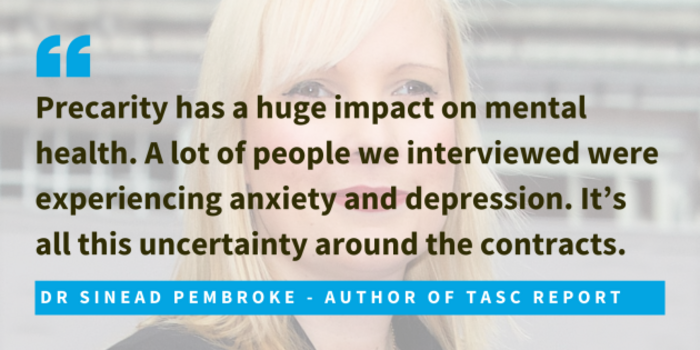
O’Keefe is currently conducting new research on precarious work in HEIs and has found the lack of paid sick leave to be “the biggest fear” around the impact of Covid-19 on these workers.
A bill to give employees an entitlement to paid sick leave was put forward by Labour leader Alan Kelly in September but still has to go through the various stages of the Dáil and Seanad.
Because of the pandemic, the Government introduced a Covid-19 enhanced illness benefit of €350 per week to people diagnosed with Covid or self-isolating. Budget 2021 also reduced the number of waiting days for the normal illness benefit – which is dependent on PRSI contributions – from six to three from the end of February next year.
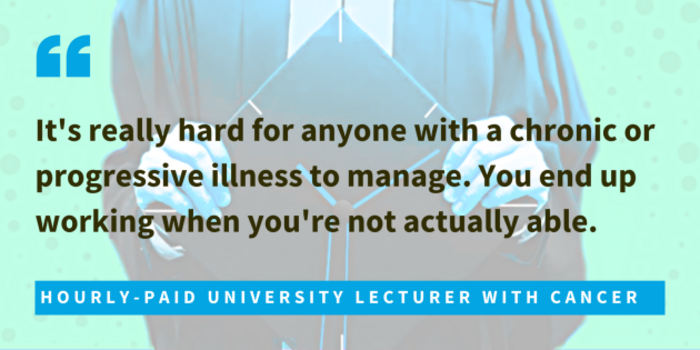
Sexual harassment ‘a concern’
In additional to impacts on finances, career progression and mental health, research from the UK and other sectors shows that women in precarious, low paid and exploitative work are also more likely to experience sexual harassment and violence in the workplace.
There are no official Irish statistics on sexual harassment occurrence involving HEI staff but it was mentioned in the study from last year by O’Keefe and her research partner Courtois, where they surveyed people engaged in academic work and who identified as precarious in Ireland. They reported that a number of their female respondents “raised the issue of sexual harassment in the workplace as a concern”.
“This is because this tends to be a transient workforce, hired for eight months on an hourly basis,” O’Keefe told Noteworthy. She added that the stigma and vulnerabilities associated with being precarious mean that people worry if they will be taken seriously. “It’s much easier to get rid of someone who’s precarious.”
A spotlight was shone on the issue of sexual harassment in Ireland in higher level recently when broadcaster and UCD academic Dr Aoibhinn Ní Shúilleabháin spoke out about her “horrific” experience. It was revealed that she had been subjected to regular harassment by a professor at the university, Hans-Benjamin Braun, over a two-year period after she had first reported the issue to the authorities in Belfield.
Ní Shúilleabháin told Noteworthy that she was on a three-year contract when the harassment began. While still in this fixed-term position, she reported it to An Garda Síochána. However, she said that being made permanent in 2018 gave her “the impetus to make the formal complaint in UCD”.
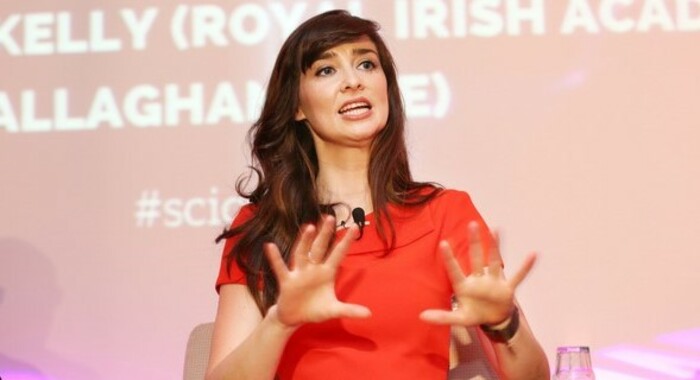 Aoibhinn Ní Shúilleabháin wants victim-centred policies to be developed.
Aoibhinn Ní Shúilleabháin wants victim-centred policies to be developed.
UCD stated that they were reviewing their policy after Ní Shúilleabháin told her story publicly. In response to this, the academic called on these policies to be victim-centred and for HEIs to engage with groups working with women when reviewing and developing policies on assault and harassment.
The National Women’s Council subsequently called on “all third level institutes to prioritise the full implementation of the ‘National Framework’ on sexual harassment and violence” in HEIs. This framework was launched by the Government last year.
With new initiatives being rolled out to try and address this, O’Keefe said that precarious workers also need to be included in their development.
Refocus by looking down the ladder
When it comes to all policies in HEIs, more women policymakers are needed, according to Ferrara. After she wrote her article on her experience of precarity as a mother, a number of women in senior positions contacted her and said they were sorry that she had to speak up. It takes women – including mothers – who are in leadership positions to recognise challenges faced by more vulnerable groups, she added.
The lack of women in senior positions in academia is often termed ‘the leaky pipeline’. The latest Higher Education Authority (HEA) statistics from 2019 show that more undergrads, postgrads and lecturers were female, but this drops substantially at higher levels to 39% of senior lectures and 26% of professors.
At the start of October, Minister for Higher Education Simon Harris announced funding for 15 female-only senior academic leadership posts through the SALI initiative. The same number of posts were funded by the Government last year and Harris said they “intend to do another 15 next year”.
“It’s so important when we look at the concept of leadership that we have diverse leadership, inclusive leadership and promote gender equality”, he added.
Noteworthy asked the Minister, through the Department of Higher Education, if any actions are being taken for diverse groups on fixed-term and temporary contracts in the third level sector. The spokesperson did not respond to this query, as well as a number of others we put to them, but said:
“The Department has engaged with the higher education sector to provide more clarity on the matters you have raised. However, a number of these questions should be raised directly with them or the Higher Education Authority.”
When we put similar questions to the HEA, a spokesperson said they do “not have responsibility in the Industrial Relations space” and referred us to the Department of Higher Education but did provide some information on the Athena SWAN awards.
In addition to these initiatives, O’Keefe said that HEIs need to look downwards to those who keep the university going – the teaching assistants, tutors, hourly-paid workers, cleaners and caterers – to really understand what gender inequality looks like, she explained.
Most recent studies on gender inequality in the higher education sector focus on those holding secure academic positions, according to O’Keefe’s article last year, with the focus on “women’s access to professorial or top managerial positions”.
“When we only look at that narrow slice of pie, that’s a problem,” O’Keefe told Noteworthy. She added without a focus on precarious workers “we’re not going to tackle it at all”.
***
In part one of our ACADEMIC UNCERTAINTY investigation we revealed that short-term contracts and instability of employment are rife across the sector. In part three, we delve into ongoing campaigns by postgraduate researchers for workers rights.

This investigation was carried out by Maria Delaney of Noteworthy. It was proposed and funded by you, our readers.
You can support the huge volume of additional work required over the past number of months because of the time consuming FOI requests by supporting the Noteworthy general fund or giving the gift of investigative journalism to a loved one this Christmas.
Noteworthy is the investigative journalism platform from TheJournal.ie. You can support our work by helping to fund one of our other investigation proposals or submitting an idea for a story. Click here to find out more >>







